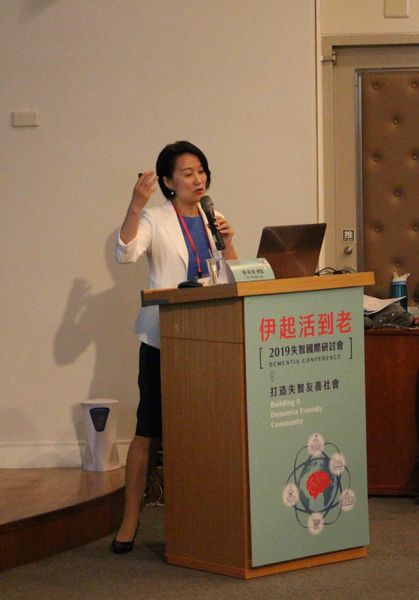
Proofreader | Vera
The aging population in Hong Kong has already increased faster than in Japan. The issues of decreasing birth rates, insufficient dementia care, and increased rate of older adults living alone is attacking Hong Kong. How do we build a dementia friendly care community? A forecast indicated that the aging population will make up 35% of Hong Kong’s overall residents by the year 2060. The increasing life expectancy, low birth rates, immigration policies, and older adults taking care of older adults are all social phenomenons related to dementia care.
When year 2060 comes, Hong Kong will face a shortage of caregivers and fostering at the same time due to the huge demand for elder care. If the health care system does not convert to the community care system, the supply of caregivers will never meet the demands of dementia care. In the 2019 Dementia Conference: Building a Dementia Friendly Community, organized by the International Development Division of Eden Foundation, Vivian Lou, the associate professor of Sau Po Centre on Ageing, the University of Hong Kong, spoke on how the government and society need to work hand in hand on dementia-friendly movements and policies.

In Hong Kong, the average life expectancy of women has extended from 87 years to 93 years. For men, it has extended from 81 years to 87 years. The aging society has become a social phenomenon. A few days ago, Vivian Lou spoke with her friend who works in a Hospital then they found some changes on 100 year-old seniors. In the past, 100 year-old seniors went to hospitals to receive medical treatments for severe diseases. Nowadays, 100 year-old seniors will also go to the hospital for general sick. This reflects Hong Kongs serious public health care pressures. “ The low birth rate and lack of community care system will lead to lack of caregivers for elders” Vivian Lou said while deeply worried.
Otherwise, one or two older adults living alone is a non-negligible issue. According to the statistic of 2016, nearly 40% of the aging population in Hong Kong is either one- elder living alone or two-elders living alone. What kinds of social problems will it the issue cause? Vivian Lou said that they may face situations such as: one older adult with mild dementia caring for a stroke affected older adult or one older adult with chronic diseases taking care of one adult with dementia.
Dementia Mental Health Policy Review
In 2018, the Hong Kong government brought up reviews of 8 dementia mental health policies -2018 Dementia Care Gaps- Mental Health Service Review.
After the review, the Hong Kong government found that the diagnosis and treatment and the reactivating follow-up were deficient in the past.
Localization of Service—Pushing dementia awareness in public education
Due to prejudice and discrimination in society, persons with dementia and their families are unwilling to admit to having the disease. In order to direct people towards having the appropriate perception of dementia, the Hong Kong Social Welfare Department in 2018 launched a 3-year public educational activity: Dementia Community Support Scheme (DCSS). The DCSS hopes to increase persistent cares and support within the community. The DCSS includes making TV and radio promotional short films, setting up dementia subject web pages, entrusting expert organizations to conduct briefing sessions of official sanction, and broadcasting an 8 episode TV series about dementia subject in 2019. Social Welfare Department has also planned dementia related activities to help citizens learn more about dementia and pay close attention to related issues.
Civil Power
At the community aspect, Hong Kong has completed a 3-year supporting plan: Persons with Dementia and Family Caregivers Companion Project (CCP Project, Phase 1 2016-2018) for elders and family caregivers. The CCP Project has provided a series of supporting services for elders with mild dementia, older adults with disabilities and family caregivers to improve their quality of life and relieve the pressures of caregivers.
Dr. Lou indicated that CCP was particularly aimed at traditional markets, security service persons and public transportation drivers. CCP has educated those people about dementia in order to carry out dementia-friendly communities. Also, CCP has arranged persons with mild dementia to clean and serve communities. Those jobs for persons with mild dementia have become whole new pages of work.
Hong Kong’s well-known Yum Cha culture also has links with being dementia friendly. However, Yum Cha restaurants are not aimed at serving family caregivers but to provide free afternoon tea to attract elders to come and receive rapid dementia diagnostic tests. In the results, over 100 persons were diagnosed with early stage dementia.
Looking back at the services that Hong Kong has done on dementia, Dr. Lou makes two conclusions on still needs to be improved on. First, every professional field has its own way to do dementia cares and services that causes the lack of resource integration. Second, Hong Kong has brought in several modes of dementia individual intervention; however, how to localize the modes is still a work to get done. These are the issues that Hong Kong needs to keep striving to resolve.